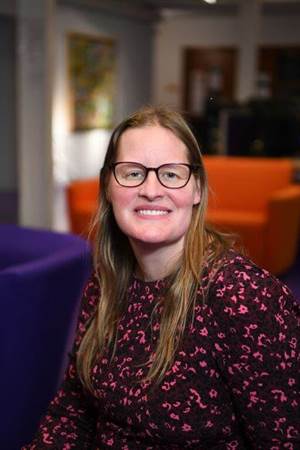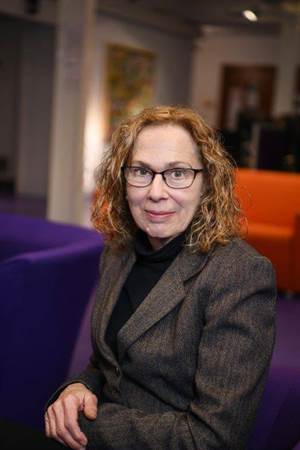The aim of the International Women's Day 2023 is to get the world talking about why equal opportunities aren't enough. People start from different places, so true inclusion and belonging require equitable action. We celebrate those women who have embraced this and hear about their roles within the Brunel Law School.
DR MERYL DICKINSON
What you do within the Law School?
 I am a Senior Lecturer and also the Director of Teaching and Learning in the Law School which means that I am responsible for any Quality Assurance aspects in respect of all programmes running within the Department. In order to do so, I work very closely with the Undergraduate and Postgraduate Programme Leads, as well as the Quality Assurance team in the College.
I am a Senior Lecturer and also the Director of Teaching and Learning in the Law School which means that I am responsible for any Quality Assurance aspects in respect of all programmes running within the Department. In order to do so, I work very closely with the Undergraduate and Postgraduate Programme Leads, as well as the Quality Assurance team in the College.
In order to ensure transparency, we have Boards of Study which importantly include our student representatives and key members of staff. This gives people an open forum to discuss any issues related to the programmes, such as student engagement, assessment, and any upcoming changes to the programmes.
I also teach on a number of modules, but my focus usually is on our second-year cohorts where I teach both the law of tort, and trusts. I have worked in these modules for a number of years and currently convene the law of tort which has a wonderful team who I love working with.
Why did you become an academic?
In many ways I would consider myself an accidental academic. I have always had a love for knowledge, but when I started my Law degree, I never imagined that the university system would be something I would fall in love with, or build a career within. As I progressed, I found inspiration from those who taught and supported me – and my journey was not without its challenges.
I began my degree as a single parent with two toddlers, and had to work my way through my LLM and PhD in order to ensure our survival. Often those around me saw more in my potential than I did myself and as I grew I developed a passion about developing my knowledge, and in passing this on to others.
Supporting those entering higher education from non-traditional, or disadvantaged backgrounds became especially important to me, in the same way as those that had helped me had done. My belief in academia as a career however only really came in the last few years as I came to gain confidence in my own self.
What do I enjoy most about teaching law?
What gives me the most joy in teaching law, is not necessarily the ‘law’ aspect itself. It’s more the interaction I have with the students and the ability to instil a passion for learning and the law which I know is something I hold close. I also know that I often learn as much from them they do from me and I enjoy reflecting on how students have responded to the type of teaching given.
The law is also ever changing and I enjoy being able to contextualise this for them and to demonstrate how this impacts their own lives, especially the different sections of society. Students come to us in quite a vulnerable position, and to be able to facilitate their learning and their personal growth is a big thing.
When they leave us, they will have to decide if law is the right career path for them, and they will have to be able to cope with employment and the exigencies of every day life. In law, as with other careers, University is only the first challenge they might face.
What do women bring to academic leadership?
For me, what women bring to academic leadership is a sense of calm, courage and compassion. Women come from a different background to men, and the feminist perspective they bring can compliment the male perspective and bring in a more balanced approach to leadership in academia. I also believe that compassionate leadership is an important element of academia right now, when burnout and issues related to mental health affect so many. Women, especially those from a background which intersects with disadvantage, have a strong attachment to compassion in a way that men do not. The challenges they have faced enable them to pass on a sense of belonging to others within academia.
DR ADRIENNE BARNETT
 What is your favourite piece of academic scholarship?
What is your favourite piece of academic scholarship?
My favourite piece of academic scholarship is Professor Carol Smart’s ‘The Legal and Moral Ordering of Child Custody’ (1991) 18(4) Journal of Law and Society 485. It is still, I think, the best piece of scholarship for revealing how and why women are so disadvantaged in family court proceedings.
Using a poststructuralist feminist perspective, Smart illuminates so clearly the moral dimensions of ‘caring for’ children, the way in which women’s caring work is devalued by dominant familial discourses, and the extent to which mothers’ work in sustaining the post-separation family is expected, taken for granted and invisible.
Here is my favourite passage from Smart’s article and probably my favourite passage full stop: ‘It would seem that the work of sustaining access is like housework: it is only visible when it is not done. When it is done it is expected, like virtue, to be its own reward, but when it is not done, the mother becomes morally blameworthy or denounced as emotionally immature.’
Which of your publications are you most proud of? What prompted you to write it?
The publication of which I am most proud is the first journal article I published from my PhD thesis: Barnett A, ‘Contact at all costs? Domestic violence and children’s welfare’ Child and Family Law Quarterly (2014) 26(4), 439. It best reflects my PhD thesis, which was a labour of love for all the women survivors of domestic abuse who thought that the family courts would protect them and their children only to discover that, as one mother put it: ‘the family courts are a playground for perpetrators’.
The article was extensively cited by Women’s Aid’s seminal ‘Nineteen Child Homicides’ report (2016) and led to legislative and practice change. The reason why I chose domestic abuse and family court proceedings as the subject of my thesis was because, as a practising family law barrister, I not only encountered the many injustices of such proceedings.
I was also, I learnt, unwittingly complicit in this myself until I actively sought to change my practice. This was once I started researching the topic around 25 years ago. I will continue to advocate for change until the family courts are a safe place for women and children.
What are you most proud of accomplishing in your career?
I would like to say that I’m most proud of achieving fundamental cultural change in the family justice system, but that is still an aspiration rather than a reality. Instead, what I am most proud of are the public law cases in which I succeeded in preventing my clients from losing their children permanently to adoption, few and far between as they were.
During my 25 years of practice as a family law barrister, I predominantly represented parents in care proceedings. Mothers facing care proceedings are among the most disenfranchised, disadvantaged population in the country. Many are victims of domestic abuse, are black or minoritized women, have very challenging personal circumstances, and a common denominator is extreme poverty. By the time a case gets to court, the odds are stacked against them and, as their barrister, you are their last bastion of hope against the power of the state.
I could still cry a river for every mother who lost her child, but I’m so damn proud of the minority of parents who succeeded in keeping them.
What was the most useful piece of advice that you were given?
The most useful piece of advice I was given was from a relative, who was a senior barrister. When I arrived in the UK from South Africa in 1978 to study Law, he said: ‘Don’t go to the Bar, be a solicitor. You’re a foreigner, a woman and you’re not establishment.’ It was good advice because it made me even more determined to prove him wrong and become a successful barrister. He wasn’t far wrong though.
When I was called to the Bar, only 12% of barristers were women and only a tiny fraction of women went to the commercial Bar. Female pupil barristers were often expected to make the tea and coffee and had to prove themselves tougher than the men to be accepted into the laddish culture of the criminal Bar. However, within four years of being called to the Bar I had established a thriving insurance law practice, and a female friend and I set up our own successful chambers in Gray’s Inn specialising in long-tail injury insurance work.
I believe that I have my sceptical relative to thank for that. As a postscript, in 1987 I heeded another good piece of advice: ‘Follow your heart’, and left insurance work for the Family Law Bar and never looked back.